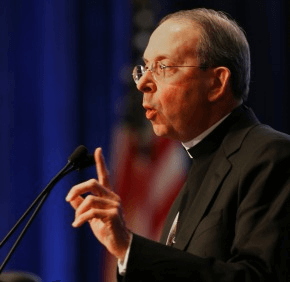
Panelist Daniel Hartman makes a point, while fellow panelists, from left, Pastor Cheryl Mitchell Gaines, Nathan Diament and Thomas Farr, listen. (Courtesy Mount Saint Mary’s University)
“The wall that used to separate church and state has become more and more blurry,” he said, also citing the Little Sisters of the Poor and their recent difficulties with the federal government.
He said that he was one of a group that met with President Barack Obama and described the solidarity thus: “I had your back on circumcision; I need yours on contraception.”


